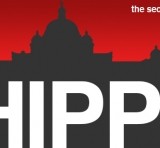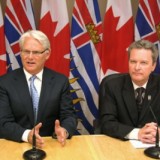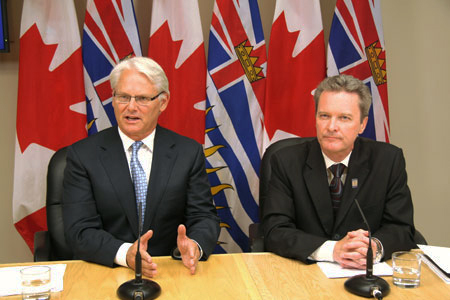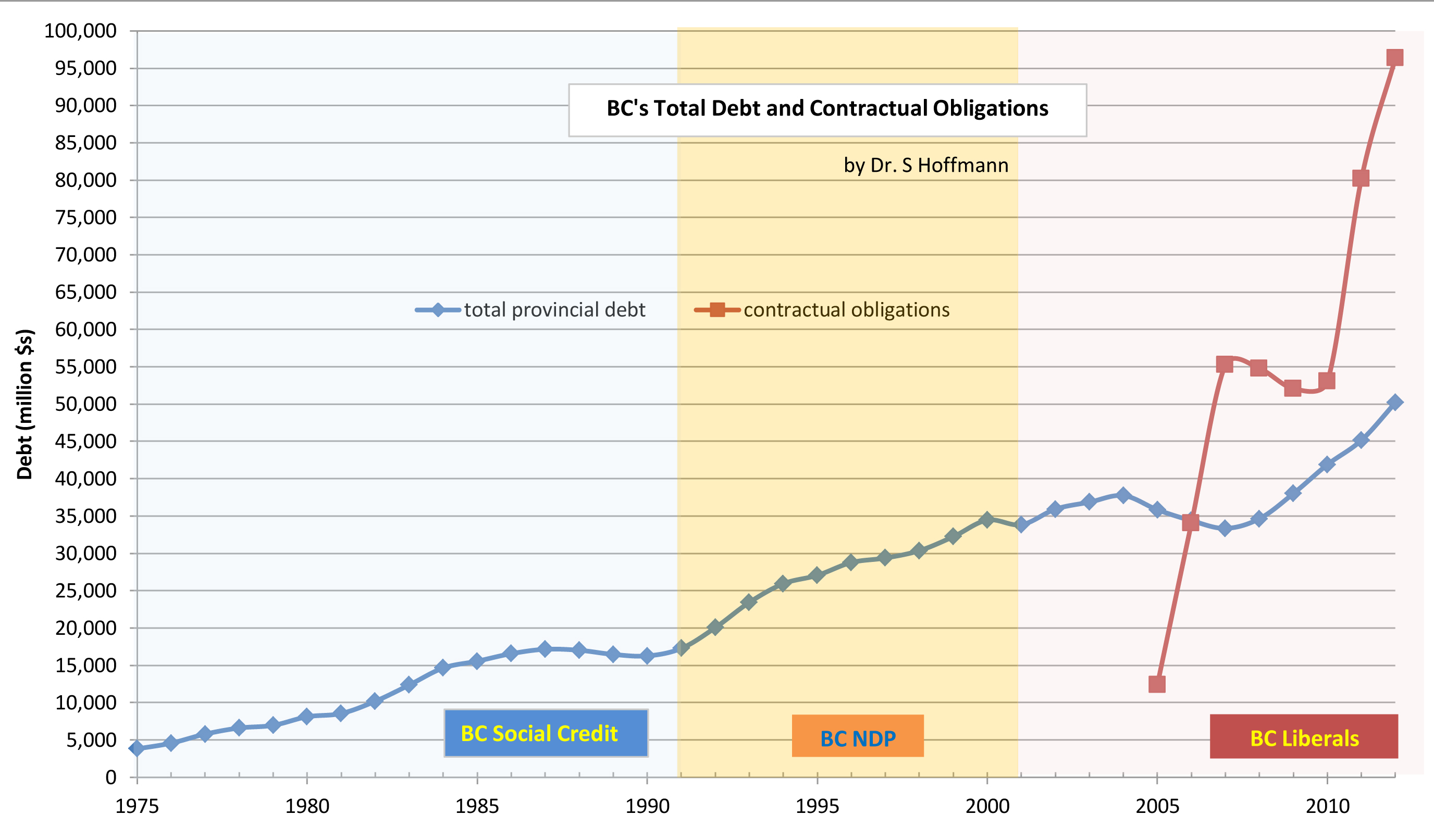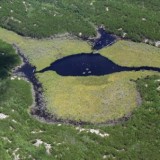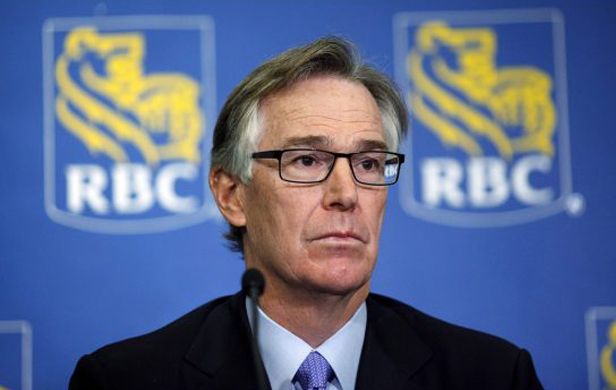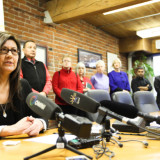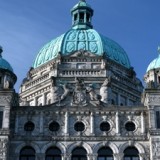As the BC election approaches, the Norwegian-dominated aquaculture industry suddenly finds itself swimming upstream.
Despite mounting evidence of its impacts on the marine environment – and over significant public and First Nations’ protest – the farmed salmon lobby has managed to maintain its controversial open net pen operations for decades, relatively unopposed at the political level.
Until now, it appears.
A series of significant events over the past few months have left the industry increasingly vulnerable to a regulatory crackdown.
The first major blow to the industry came in October of last year, when Justice Bruce Cohen got tough on salmon farms in the final recommendations of his 2-year judicial inquiry into collapsing Fraser River sockeye stocks. While he acknowledged that no “smoking gun” emerged from the exhaustive $25 million investigation, aquaculture was singled out as a key suspect.
Cohen’s recommendations to protect wild salmon from open net pen salmon farms included:
- Prioritizing the health of wild salmon over suitability for aquaculture when siting farms
- Conducting more research into diseases that may be impacting wild salmon
- Properly implementing the Precautionary Principle and removing farms in the Discovery Islands region (noted as particularly dangerous to migrating salmon runs) should more definitive evidence come to bear that they cannot safely coexist with wild fish.
It would take some six months for Cohen’s non-binding recommendations to register politically – but boy are they starting to now.
First, in late March, Liberal Premier Christy Clark came out with an unexpected commitment to implement a number of Cohen’s recommendations. Clark vowed to cap future open-net salmon farms in the Discovery Islands, a critical wild salmon migratory route. Liberal Agriculture Minister Norm Letnick stated, “[Cohen] basically says we should use the Precautionary Principle and what we’re doing today as a government is agreeing with him.”
If the salmon farmers weren’t sweating before, this will surely have caught their attention. This is, after all, a government which has proven overwhelmingly sympathetic toward the industry throughout the past decade – even going as far as reimbursing it for environmental fines collected by the NDP.
Though a court case won a few years ago by independent biologist Alexandra Morton and her lawyer Greg McDade forced the federal government to take back the regulation of fish farms, the province retained power over the licensing and location of farms. Thus a change in policy at the provincial level could still spell trouble for the industry.
No sooner had Clark issued her tough talk on salmon farms, than NDP environment critic and likely future minister Rob Flemming moved to one-up her. Flemming told CBC radio, “They’ve been missing in action on this file for so long that to say on a friday afternoon six months after Justice Cohen delivered his report that they deign to agree with his recommendations just shows that they have not paid considerable attention to this.” According to the CBC story, “Flemming says the NDP would initiate a review of the issue including looking at banning open net fish farms along key salmon migration routes.”
Not just capping new farms, but removing and banning existing ones. That’s about as close to Justice Cohen’s prescriptions as any party – federal or provincial – has come to date.
Days later, NDP Agriculture Critic Lana Popham – also a leading candidate to take up the same portfolio in Cabinet – posted a statement on her facebook page, relaying the NDP’s developing policy on the issue. As environment and agriculture ministers respectively, Flemming and Popham would be the new government’s point people on the file – their comments here are deliberate and significant.
Popham’s preface to the policy statement suggested the public campaign for aquaculture reform is not going unnoticed. “Thank you to all the salmon warriors out there,” Popham wrote. “You’ve directed a lot of barbs our way recently, but your efforts to push political parties to do whatever is necessary to protect wild salmon is a great contribution to BC. Keep it up!”
The statement itself denotes the party’s likely framing of the issue going forward – i.e. addressing the economic risk-reward proposition: “[Wild salmon] is important for our coastal ecology, for the wild and sports fishing economies and particularly for First Nations. We also recognize that BC has an aquaculture industry that creates direct and indirect employment in our coastal communities and that it is incumbent on all to make sure the industry has minimal impact.”
The statement continues:
New Democrats have clearly stated that if we form government in May, we will work with the DFO to act on the recommendations from Justice Cohen including:
- regularly revising salmon farm siting criteria to reflect new scientific information about farms on or near Fraser River sockeye salmon migration routes as well as the cumulative effects of these farms;
- explicitly considering proximity to Fraser River sockeye when siting farms;∙
- limiting salmon farm production and licence duration;∙
- using the precautionary principle to re-evaluate risk and mitigation measures for salmon farms in the Discovery Islands, including closing those farms that are determined to pose more than a minimal risk of serious harm to the health of migrating Fraser River sockeye.
In addition, we will maintain the existing moratorium, introduced in 2008, on new fish farm licenses on the North Coast.
The NDP’s repositioning on the file comes following a new wave of public interest in the subject. Salmon Confidential, a 70-minute documentary which tracks Alexandra Morton’s research into viruses impacting both farmed and wild fish, has reached over 100,000 people online since its release last month. It is currently filling halls around the province during a series of pre-election screenings. These events are drawing in high-profile speakers such as David Suzuki and Green Party Leader Elizabeth May.
Meanwhile, at the federal level, the Harper Government did an about-face recently, agreeing to take part in and help fund a new large-scale program to test for viruses likely connected with fish farms. The work is being led by the Department of Fisheries and Oceans geneticist, Dr. Kristi Miller, whose leading-edge research was a key focus of the Cohen Commission.
Miller made global headlines when, prior to her subpoena by Justice Cohen, she was muzzled from speaking to media about her work. Fromrecent interviews she’s given on this new research program – co-sponsored by Genome BC and the Pacific Salmon Foundation – it appears, at least for the time being, that muzzle has been removed.
The aquaculture industry should be concerned about these developments, not just because of what this new research may uncover, but because it demonstrates that even the Harper Government has been forced to change its approach to public concerns surrounding salmon farms. That includes a recent federal report suggesting it’s time to get serious about moving to closed-containment technology, which separates farmed fish from wild.
Finally, the industry should be concerned that the jig is up for the defense upon which it traditionally falls back – namely, the “jobs” argument. Recent data confirm that local economic benefits from aquaculture simply pale in comparison to the industries it puts at risk.
For instance, in 2011, according to DFO and Stats BC, sport fishing produced revenues of $925 million, contributing $325 million to BC’s GDP and 8,400 direct jobs. Compare that with the Norwegian-dominated aquaculture industry, which produced $469 million in revenues (that’s for all aquaculture, of which salmon farms are only one component). Salmon farms specifically contributed just $8.5 million to our GDP.
That’s because they invest very little locally in plant and equipment and produce only a fraction of the 1,700 relatively low-wage jobs across the entire aquaculture sector – which includes shellfish and other finfish. Moreover, the profits flow out of BC to foreign shareholders.
That paltry $8.5 million figure was down 8% from the previous year, and based on reports of numerous farms in the Campbell River area having been fallowed over the past year – for problems left unexplained by the industry – we can expect the 2012 numbers to slide even further.
By contrast, the province’s $13.4 Billion tourism industry (up 44% since 2000) is built largely on BC’s “Best Place on Earth” / “Supernatural BC” brand, which depends greatly on wild salmon and produces vastly more jobs than do salmon farms. The provincial NDP is already showing signs of grasping these facts and understanding how they can be used to frame industry reforms.
In other words, the final fig leaf protecting the industry is about to be swept away in the coastal breeze.
It remains to be seen, post-election, where a new NDP government goes with its aquaculture policy, what these new tests yield, and how the Harper Government reacts to them. The industry has proven as prone to escape as the creatures it rears. Yet, for the first time in a long time, the tide is clearly turning against the Norwegian farmed salmon lobby.
Catch Alexandra Morton and David Suzuki at a presentation and discussion of Salmon Confidential this Thursday evening, April 18, at Vancouver’s Stanley Theatre. The film will be shown in Sidney on the evening of the 20th, featuring Elizabeth May and BC Green Party Leader Jane Sterk.
